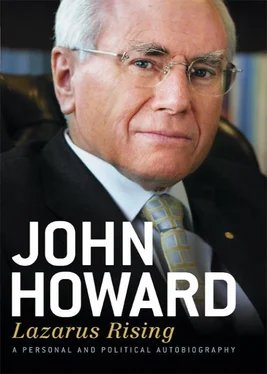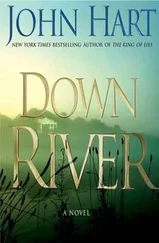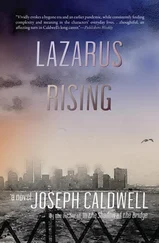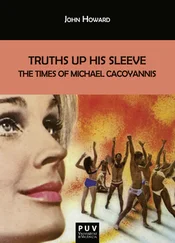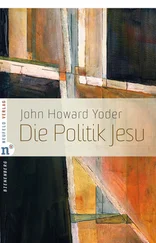Having earlier in the year rejected my plea for a broadening of the indirect tax base, accompanied by reductions in personal income tax, perversely, senior ministers agreed to include in the 1981 budget some broadening of the indirect tax base (although not as much as I had earlier proposed), but with no personal tax cuts to smooth the acceptance of the indirect tax changes. The extra revenue from the broadening of the indirect tax base was used to further cut the deficit, so as to take pressure off interest rates.
The Government had lost control of the Senate on 1 July 1981, and, as a consequence, never really had a hope of getting the indirect tax changes in the budget passed. The folly of not acting at the beginning of the year, when there were still the numbers in the Senate to achieve reform and change, was there for all to see. It was immensely frustrating.
For decades the Metal Trades Award had been the benchmark for wage fixation in the Australian industrial relations system. In 1981 pressure mounted for a big increase under this award. While some firms could afford to pay increases, many could not. This was always the inherent contradiction, indeed flaw, in a centralised wage-fixation system. It formed the basis of the intellectual argument that I and many others mounted against the system through the 1980s.
After strike action which caused significant industrial dislocation, there was a settlement which conceded much of what the unions had wanted. On 18 December 1981 the Arbitration Commission ratified an agreement between the Amalgamated Metal Workers and Shipwrights’ Union (AMWSU) and the Metal Trades Industry Association (MTIA), the relevant peak employer group, for a wage rise of $41 a week and a 38-hour week.
Before long the implications were clear. The December 1981 agreement flowed through to all of the other awards, and before long firms unable to pay the higher wages began retrenching staff.
That was how a centralised wage-fixing system worked. For me it was a political, as well as economic, nightmare. The Government was left marooned without a policy response, other than the highly unattractive one of increasing interest rates to restrict the capacity of firms to pay higher wages. That was no response at all, because it would result in still higher unemployment. What our side of politics needed, and did not have at that point, was a totally different approach to wages policy.
Federal Labor was the political beneficiary of the wages explosion, but it also recognised the implications of what had happened. Some years later, Paul Keating would famously say to George Campbell, the Federal Secretary of the Amalgamated Metal Workers’ Union (AMWU) at the time of the explosion and later a Labor senator, that he and his associates ‘carry the jobs of the dead men’ around their neck, a reference to the widespread unemployment caused by the wages breakout. Labor’s political argument was that the Liberal Party had no way of controlling wages, except by the blunt instrument of tightening monetary policy through much higher interest rates, thus squeezing firms, which in turn laid off more staff.
This argument would remain valid if a centralised wage-fixing system continued, whereby across-the-board wage increases were delivered irrespective of individual capacity to pay. It would be an entirely different matter if that approach were abandoned, and a system of workplace or enterprise bargaining were introduced. That was the system for which I was to campaign for years. If there were to be a change to such a system, then union power, most particularly the monopoly the unions held over the bargaining system, would need to be rolled back. This was to become the real battleground in a debate which is yet to be fully resolved and remains intensely relevant to Australia’s economic future.
The year 1982 opened amidst a deepening world recession, which Australia did not escape. Stagflation, the economic disease of the 1970s and ‘80s, afflicted most developed economies. In the United States, interest rates remained very high; for this and other reasons, they were also high in Australia. In 1979 Paul Volcker, a dedicated inflation fighter, had become Chairman of the Federal Reserve in America and signalled that he would push interest rates up to the level necessary to squeeze inflation out of the system. This approach worked. In 1980 annual inflation in the United States was 13.5 per cent. By 1983 it had fallen to a little over 3 per cent.
This year was made worse by one of the most severe droughts of the 20th century, which afflicted large parts of eastern Australia. It threatened the survival of breeding stock as well as producing the usual debilitating effects on farmers and communities of all bad droughts. The response of the Fraser Government was comprehensive and effective, with interest-rate subsidies helping preserve breeding stock, so vital to Australian pastoralists.
On 4 January, the former prime minister Bill McMahon retired from the Sydney seat of Lowe, which he had held since 1949. This would prove to be a bad by-election for the Government. There was a swing of more than 7 per cent and, on 13 March, Labor won the seat from the Liberal Party for the first time since its creation, at the 1948 redistribution.
1982 was also to become a watershed year for Victoria politically. After 27 years of Liberal government, inaugurated by Henry Bolte in 1955, the Labor Party won office under John Cain on 3 April. The psychological impact of this on Liberals from Victoria was immense. Intellectually they had prepared for defeat, but the jewel-in-the-crown sentiment ran deep in this Liberal division.
With the Victorian election out of the way, Fraser acted to bring the long-simmering stand-off between himself and Andrew Peacock to a head. It had become a constant distraction for the Government and a regular signal to the community that the Liberal house was divided. Fraser called a party meeting for 8 April and indicated that he would resign the leadership, thus providing Peacock with the opportunity of challenging for the top job. I never thought that Peacock had a chance of toppling Fraser. The only issue was the size of Fraser’s victory.
In the weeks preceding Fraser’s initiative, a group of Liberal MPs, led by John Hyde and Ross McLean, had come to me with the proposition that, if there were to be a spill of leadership positions, then I should contest the party leadership. They said they had lost faith in Fraser’s economic direction, but that Peacock was not committed to the type of economic policies they thought Australia needed in the years ahead.
I was flattered by their offer of support but, nonetheless, made it very clear that I did not think it was in the best interests of the Liberal Party for me to stand, that I would support Fraser and campaign for him, and I urged them to do likewise. They were not entirely surprised by my response. But their approach had told me that in the year or more which had passed since the 1980 election, the dries had not only transferred their support from Lynch to me, but had well and truly given up on Fraser.
Phillip Lynch decided that he would give up the deputy leadership at the same time as the ballot for the leadership. After a quick assessment of support, I decided to nominate for that position. I had Fraser’s support. He promoted the advantages of a deputy coming from Sydney, as against his Melbourne attachment. This was my first experience of a contested party room ballot, and I did the only thing that seemed logical. I directly approached people for their votes, naturally excluding some who I felt intuitively would never vote for me. Michael MacKellar, a fellow New South Welshman and the Health Minister, also stood. It seemed pretty clear that the great bulk of those who were going to side with Peacock against Fraser would also support MacKellar against me.
Читать дальше
